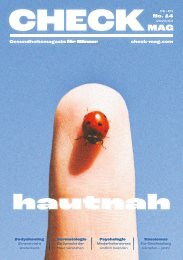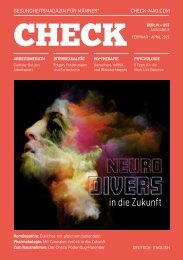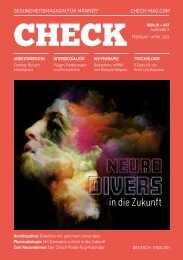CHECK Magazin - Gesundheitsmagazin für Männer No.15
Auf die wissenschaftlich nicht unbegründete Angst, dass der Planet Erde irgendwann für Menschen nicht mehr bewohnbar ist, reagieren die einen mit Widerstand, die anderen mit Ignoranz. Eine null Zukunft steht im Raum, dabei geht das Leben auf jeden Fall weiter. Nach dem Tod kompostieren wir und landen — über viele lange Umwege — vielleicht auf einem Salatteller, den eine (Leih-)Mutter während ihrer Schwangerschaft ißt. Der Punkt ist, dass hier niemand wirklich rauskommt. Warum also gestalten wir uns und den anderen die kurze Zeit nicht so angenehm und gesund wie möglich? Wir haben daher auf eine Sache geschaut, die wir alle gemeinsam haben: Wir altern, hoffentlich mit null Gewalt und Emissionen.
Auf die wissenschaftlich nicht unbegründete Angst, dass der Planet Erde irgendwann für Menschen nicht mehr bewohnbar ist, reagieren die einen mit Widerstand, die anderen mit Ignoranz. Eine null Zukunft steht im Raum, dabei geht das Leben auf jeden Fall weiter. Nach dem Tod kompostieren wir und landen — über viele lange Umwege — vielleicht auf einem Salatteller, den eine (Leih-)Mutter während ihrer Schwangerschaft ißt.
Der Punkt ist, dass hier niemand wirklich rauskommt. Warum also gestalten wir uns und den anderen die kurze Zeit nicht so angenehm und gesund wie möglich? Wir haben daher auf eine Sache geschaut, die wir alle gemeinsam haben: Wir altern, hoffentlich mit null Gewalt
und Emissionen.
Erfolgreiche ePaper selbst erstellen
Machen Sie aus Ihren PDF Publikationen ein blätterbares Flipbook mit unserer einzigartigen Google optimierten e-Paper Software.
<strong>CHECK</strong> MAG #15<br />
Forms of empathy<br />
Emotional empathy<br />
Being able to feel what other people feel.<br />
Cognitive empathy<br />
Understanding the thoughts and intentions<br />
of others and being able to draw conclusions<br />
about their behaviour.<br />
Social empathy<br />
Being able to understand social behaviour,<br />
for example in families, teams, companies,<br />
LGBTIQAA* communities.<br />
You get to my age!<br />
Digitalisation brings us new faces and stories every<br />
day, which the brain cannot process emotionally<br />
because of the quantity. So in order to continue<br />
consuming, the emotions have to be “switched<br />
off”. This leads to alienation, because although<br />
one hears and sees the emotions of others, one no<br />
longer feels them. Apathy sets in, which anyone<br />
who has taken the U2 in the morning can confirm:<br />
mobile phone or not, when it gets too crowded,<br />
most people go into zombie mode.<br />
According to one study, age has no general<br />
influence on the ability to empathise with others,<br />
but with increasing age there is a demonstrable<br />
decrease in emphatic readiness, and this<br />
often occurs when the outside world is not seen as<br />
relevant to the elderly. 2<br />
The four pillars of empathy<br />
Professionals use these terms,<br />
among others, for training empathy:<br />
Perception<br />
How are the others?<br />
Gestures, facial expressions,<br />
body language, statements,<br />
voice, emotions<br />
Resonance<br />
How do we react?<br />
Consideration, words, action,<br />
compassion, acceptance<br />
Understanding<br />
Why are they feeling this way?<br />
Motives, causes,<br />
circumstances<br />
Anticipation<br />
How will others continue to react?<br />
Emotionally,<br />
rationally<br />
The frontal lobe (prefrontal cortex)<br />
performs higher cognitive functions such as<br />
language, memory, problem solving and<br />
judgement. It also plays a major role in the<br />
expression of emotions. In humans, it is not<br />
fully mature until around the age of 25.<br />
The language of the heart<br />
The trend study “Youth in Germany – 2023 with<br />
Generation Comparison” 3 asked different age<br />
groups (Baby Boomers, Millennials, Gen Z) about<br />
their values. It was concluded that there are no<br />
major differences between the generations: family,<br />
health and freedom are of the highest importance<br />
for all groups. If everyone finds the same things<br />
important, then why is there so much conflict?<br />
This may be because not everyone is emphatic to<br />
the same and healthy degree. One study found that<br />
sexual orientation is related to the degree<br />
of empathy: based on self-report, heterosexual<br />
women showed the highest level of empathy,<br />
followed by gay men, then lesbian women and<br />
finally heterosexual men. 4 A similar picture<br />
emerged from the analysis of brain activity that<br />
was also carried out: the area of the TPJ (Temporal<br />
Parietal Junction – temporal and lateral part of the<br />
head), which is related to the perception of other<br />
brain areas, was more active in subjects who felt<br />
attracted to men than in those who felt attracted<br />
to women.<br />
The older lady walking slowly in front of you<br />
doesn’t care if you have to go somewhere fast.<br />
Instead of recognising and thus understanding the<br />
reasons for the slow walking via the brain regions<br />
with mirror properties, stress and aggression arise<br />
because the slow movements of the old lady are<br />
not perceived emphatically. A direct, friendly word<br />
in everyday life may therefore help everyone here,<br />
leading to less apathy and alienation.<br />
1<br />
1 https://www.science.org/doi/10.1126/science.1070311<br />
2 https://gepris.dfg.de/gepris/projekt/197225532/ergebnisse [n.d.]<br />
3 https://simon-schnetzer.com/jugend-in-deutschland-2023-mit-generationenvergleich/<br />
4 https://www.newswise.com/articles/empathy-is-related-to-sexualorientation<br />
[n.d.].<br />
Community12
















